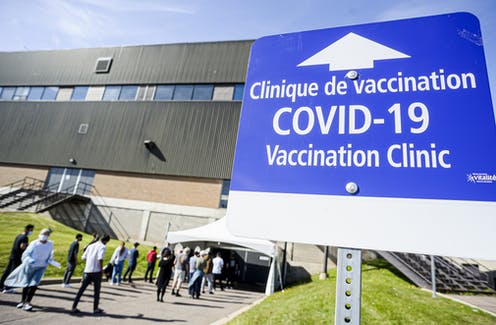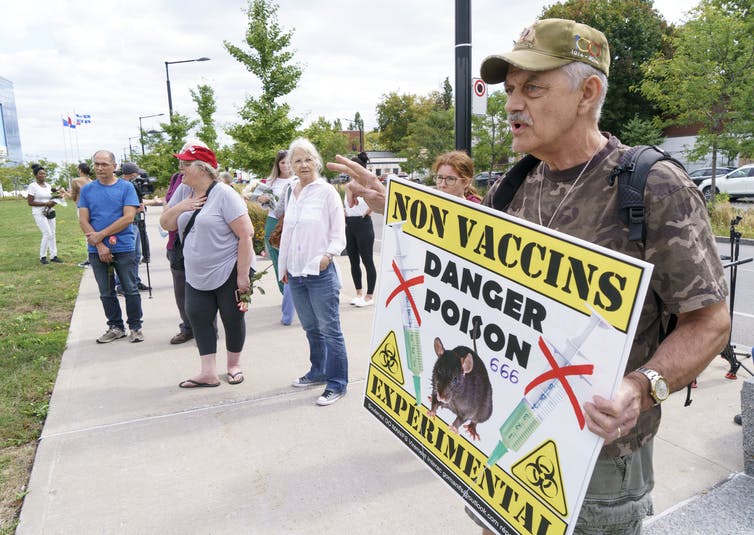
The fourth wave of the COVID-19 pandemic is putting pressure on hospital networks, upsetting many and making vaccine refusals seem foolish. To better understand what leads someone refuse or delay vaccination, it is important to identify the psychological barriers that underlie the decision.

Click here for more articles in our series about vaccine confidence.
As a clinical psychologist who works mainly with adults suffering from personality, anxiety and mood disorders, I have a front-row seat for observing the distress, frustration and unease of those at the heart of this pandemic. Behind the refusal to be vaccinated, there is a complex emotional spectrum that colours each person’s behaviour and choices.
Apart from religious and cultural reasons or health conditions that justify not receiving the vaccine, the choice to refuse vaccination can be explained by a range of other factors. The following nine factors provide a good picture of the complexity of the situation.
Table of Contents
Misunderstanding and lack of information
A first barrier is lack of understanding about the vaccine or misunderstanding the necessity of vaccination.
Faced with contradictory opinions and a lack of information, some people are perplexed: Why should you get vaccinated if you can still catch the virus and transmit it? Why vaccinate young people if they are less vulnerable to the virus?
Fear of needles … and vaccines
Some people have a strong fear of needles or the pain related to vaccination. Although this fear may seem irrational to others, it is something the sufferer feels intensely.
Apprehension about needles or pain is sometimes so anxiety-producing that it can lead a person to avoid any situation that involves vaccination. Sometimes just seeing images of vaccination can provoke anxiety.
Read more:
Needle fears can cause COVID-19 vaccine hesitancy, but these strategies can manage pain and fear
In other cases, the fear is related to the possible side effects of the vaccine. Some people may not refuse to be vaccinated, but will wait until more people have been vaccinated so they can see if there are any long-term side effects.

The Canadian Press/Graham Hughes
Feelings of helplessness
A further psychological barrier comes from the feelings of helplessness and discouragement in response to the possibility that the pandemic will continue, despite vaccination efforts, especially given the detection of new variants.
The term “pandemic fatigue” reflects the weary and demotivated feeling that arises during a time of crisis when events appear to repeat themselves. Resignation and loss of hope can lead to reduced motivation, and an unwillingness to follow recommendations, including vaccination.
Aware but not concerned
Other people are aware of the impact of the pandemic, but do not feel personally concerned: “I’m healthy, so that protects me.”
These individuals often lack knowledge about the disease and vaccination, so they are not particularly concerned about the harmful effects of the virus on their health or the risks of transmission to others. It’s worth noting that these people are not actually be opposed to the vaccine.
Mistrust of ingredients
Some people pay close attention to what goes into their bodies and may be concerned about the ingredients of the COVID-19 vaccine. They experience visceral discomfort at the idea getting a vaccination, and may perceive the COVID-19 vaccine as an intrusion, contamination or aggression.
Not knowing about the ingredients of the vaccine, they may be reluctant or even opposed to receiving it.
Anxiety and denial
Everyone reacts differently to anxiety-provoking situations. Some will jump into action and look for solutions, others will confide in loved ones or feel emotionally overwhelmed.
Still others will go into denial. Denial is an automatic, unconscious reflex that works as a Band-Aid to control anxiety. In the pandemic context, this may be expressed as denial of the seriousness of the disease, denial of one’s own vulnerability to contracting the virus, or even denial of the existence of the virus itself.
Sense of rejection and exclusion
As social beings, we are extremely sensitive to rejection. Rejection may be more common and painful for some than for others. These people feel more excluded from society and do not recognize themselves in the official discourse or the norms being proposed in response to the pandemic.
When health measures are announced, these people may find them controlling. When one feels neither represented nor listened to by the authorities, or when one is parodied or criticized by other groups in society, the wounds of a past marked by rejection are reactivated and replayed.
These people will also feel excluded and less likely to follow recommendations. They are also more likely to feel better understood by alternative and refractory voices that make them feel heard at last.
Dependency and conflict avoidance
Some people are more dependent on the opinions of those closest to them. The dynamics of the relationship are such that the person doubts themselves, relies on the other person to make day-to-day decisions for them and idealizes the other person or seeks to minimize conflicts with them.
In these cases, the person’s position and choice will be influenced by the fact that their peer does not consider vaccination to be important.
Crisis of confidence
The previously mentioned factors, such as mistrust of what goes into the body, denial and rejection, may crystallize into a greater distrust of government sources, health authorities and the pharmaceutical industry. This can also turn into a crisis of confidence and distrust of public health recommendations.
Belief in conspiracy theories and the rejection of authority can shape one’s thinking and identity. That in turn creates a danger of polarization.

The Canadian Press/Paul Chiasson
Other factors could be added to this list of what contributes to vaccine hesitancy and refusal. As a psychologist, I consider it essential to understand why a person refuses to be vaccinated. The measures and solutions to encourage vaccination reach people in different ways, depending on how they process information in the first place.
Some people will need explanations, others will need to be accompanied when they get vaccinated, and still others will need to be in a space where they feel listened to and feel that their irritation is accepted. Finally, to avoid feeling “controlled” some people will prefer following alternative recommendations, such as getting regular screening tests.
In order to offer relevant solutions and move forward collectively in this pandemic crisis, we need to better understand each other’s reactions. I believe that this understanding will better guide authorities in communicating information and how to both decide on and present public health measures. For any measure to be respected, we must know the underlying reasons people reject it.
Do you have a question about COVID-19 vaccines? Email us at ca‑vaccination@theconversation.com and vaccine experts will answer questions in upcoming articles.
![]()
Geneviève Beaulieu-Pelletier received funding from SSHRC for her work on activism and radicalization.























